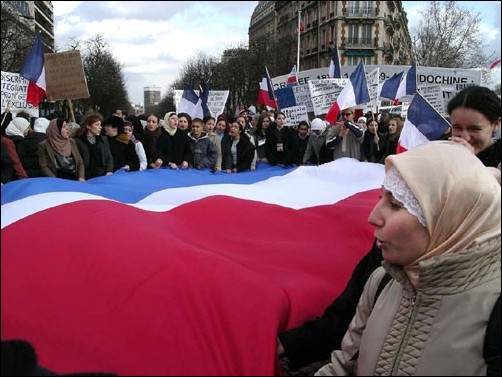French Muslims protest banning of Hijabs

Image: French Muslims protest banning of Hijabs:Veiled women holding the French flag march in protest Saturday, Feb. 7, 2004, to the Assemblie Nationale, the French equivalent of the United States House of Representatives, in central Paris. Hundreds marched to protest the new French law banning most re:
February 10, 2004
PARIS – French lawmakers will vote on a controversial bill today that could ban Muslim women from wearing religious headscarves in public schools. It is a bill that has sparked a negative reaction among members of Sacramento State’s Muslim community.
The bill, called for by French President Jacques Chirac in December, would forbid the wearing of any religious objects by students and government employees in France’s public schools, universities and government offices. However, the bill allows “discreet” items such as a small crucifix or Star of David’s necklace, but forbids items that immediately denote religious affiliation, such as the Muslim headscarf , also known as the Hijab.
French lawmakers also want the law to have Muslim men shave their beards because it is deemed a religious expression, but Christian men would be allowed to keep theirs.
“The Islamic veil…has no place in state schools. State schools will remain secular,” Chirac said in a Dec. 17, 2003, speech.
For some, the proposed law is seen as an attack on religious freedom and expression. Many women in Sac State’s Muslim population, a group that comprises two percent of the student body, wear the Hijab.
“For us, the Hijab is part of our clothing,” said Basma Marmosh, a senior international communications major and vice president of the Sac State Muslim Students Association. “Asking us to take it off would be like asking a woman to take off her shirt.”
Other Muslim students, like junior international relations major Maren Shawesh share a similar view of the proposed law.
“The French are forcing Muslims to what they think is the French identity,” Shawesh said. “France is just being consistent with the worldview of Islam that it somehow has negative connotations.”
Sac State history professor Afshin Marishi, who teaches Middle Eastern and European history, said that the idea behind this law is the unwillingness of the French to allow the assimilation of Muslims into mainstream French culture.
“People here in the United States really underestimate how racist France really is,” Marishi said. “I don’t think the law should pass because it’s ridiculous to impose secularism on French Muslims. The approach should be to evaluate themselves into allowing Muslims into French culture and society.”
Muslims make up two percent of France’s population making it the largest Muslim population in Europe and it is a result of France’s former colonial possessions in North Africa.
In recent years, Europe has witnessed many violent attacks against Islam in such places as Germany, Belgium and France. Attacks have included the burning of Muslim businesses, assaults and murders of Muslims. Many view this proposed law as a governed extension of anti-Islamic sentiment.
The French media have reported that the law will most likely pass in the National Assembly and would become effective in September. Chirac’s vision of national secularism has the country just about evenly divided in opinion.
“There are two wings of French society,” Marishi said. “One that is very progressive and open-minded and there is the one that is very conservative.”
Marmosh agrees that the proposed law is unacceptable and a violation of human rights.
“If this thing passes, how would it make France any different from any other dictatorship saying what you can wear and what you can think?” Marmosh said.
Despite recent racial and ethnic tensions in the United States since the terrorist attacks of Sept. 11, 2001, some Muslims believe that a national law of state-enforced secularism could not exist in the United States.
Marmosh believes that a law like that could not pass in the United States because of the strong Christian population. The French law calls for the abolition of all large religious objects and expression from French schools and government offices.
“I can see somebody trying to do something like that here, but I see them failing,” Shawesh said. “Imposing your beliefs on someone else is against the American way.”
The proposed secularism law has been condemned in a series of protests in front of France’s embassies and consulates around the world. One such protest took place in front of the French Consulate General in San Francisco in January. Marmosh and Shawesh participated in the protest.
“Christians and Muslims marched along side each other in San Francisco against this law because it is a strike against everyone’s freedom,” Shawesh said.
Today’s vote has some feeling weary about the global view of Islam, but some remain positive about the proposed law.
“France doesn’t seem to have the diversity and unity that the U.S. has, and I’m expecting it to pass, but I do have my optimistic side,” Marmosh said. “With this law, there is definitely going to be dissention.”






















































































































